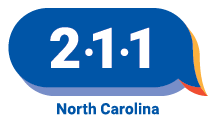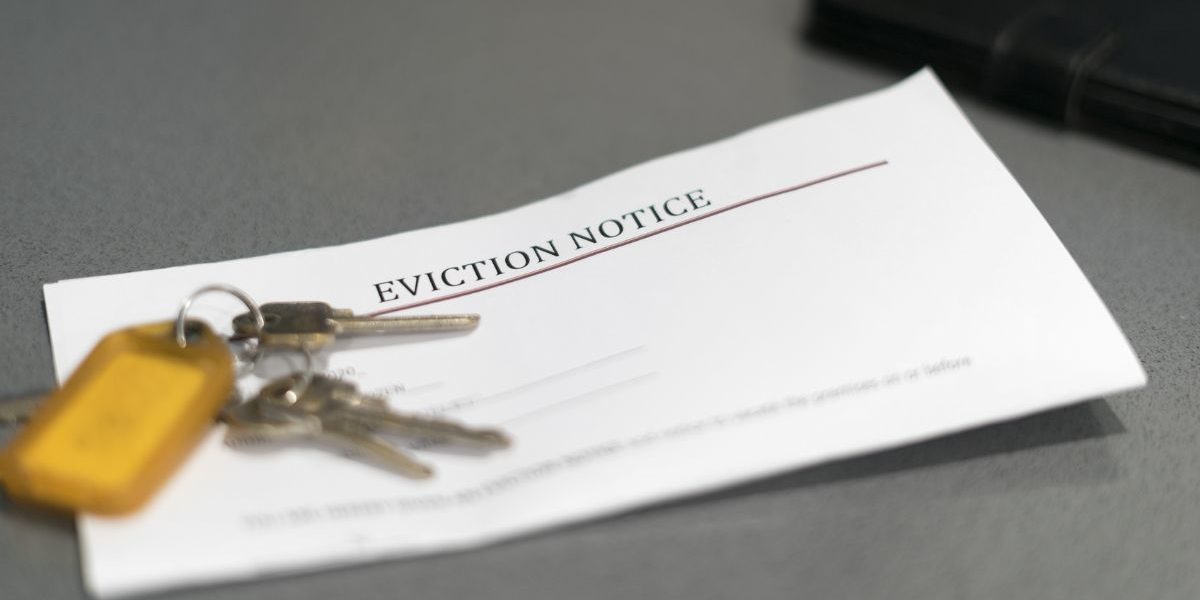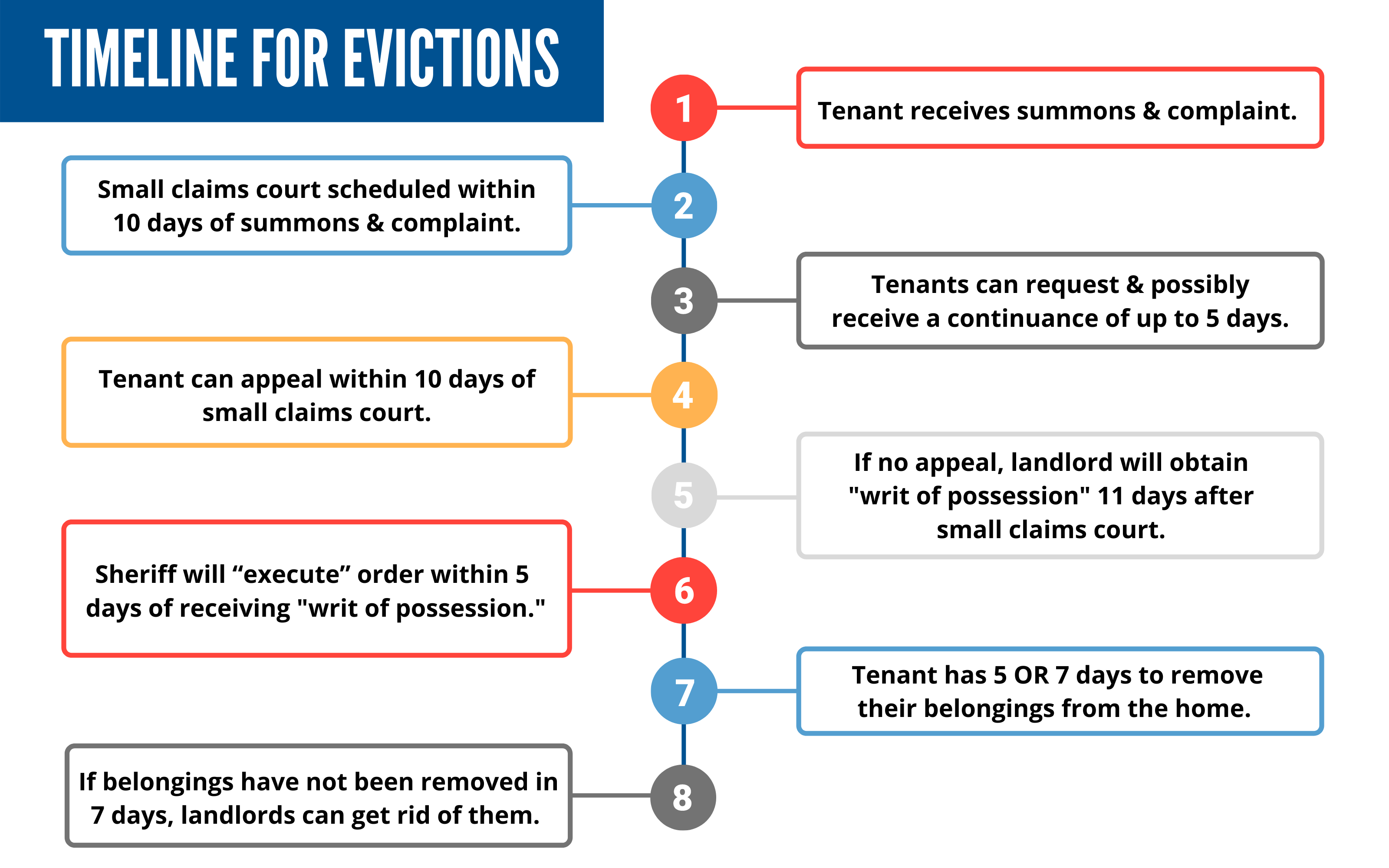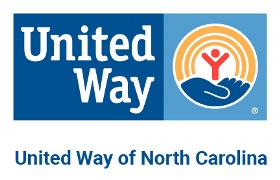What is an eviction?
Eviction is the removal of a tenant from rental property by the landlord.
Legal evictions are not the same as “notices to vacate” from landlords. Landlords must make a demand for possession or a demand for payment before an eviction filing in court.
Why do people get evicted?
Most evictions happen because renters cannot or do not pay their rent. Landlords can also evict renters for other reasons, including taking on boarders, damaging property, causing a disturbance, or breaking the law.
How does an eviction process work?
To evict tenants, landlords MUST take them to court. The landlord cannot use self-help measures such as changing the locks or stopping the utilities. Tenants can only be evicted by the Sheriff’s Office, and only after the Court has entered a judgment against them and the Clerk issues a “Writ of Possession.” Normally, the eviction process takes about 3 weeks.
1. To begin the eviction process, the landlord must file a Magistrate’s Summons and a Complaint in Summary Ejectment with the Clerk of Court. In most cases, the landlord must give the tenant advance notice to end the lease or make a demand for past-due rent before starting the eviction process.
- The landlord must serve the tenant with the Summons and Complaint by paying the Sheriff’s Office or a process server to deliver it personally, or mail it by registered/certified mail or delivery service (FedEx, UPS, etc.). The landlord cannot personally deliver the Summons and Complaint.
2. Small claims court will be held within 10 days after the landlord files the summons and complaint. The date and time will be listed on the Summons and Complaint, and it is important for the tenant to be in court at this time.
3. Tenants can receive a continuance (postponement of court date) of up to 5 days with the landlord’s agreement. This extra time allows tenants to find a way to pay past-due rent
4. After a small claims court hearing takes place, the tenant can appeal for a new trial in District Court within 10 days. There are several ways to defend against an eviction in Court – these can include the landlord not giving proper notice, not properly serving the tenant, beginning the eviction process too soon, accepting some rent from the tenant, or failing to make necessary repairs.
- The tenant can stay in their home during the appeal if they file a “Bond to Stay Execution” and agree to pay future rent to the court each month until the new court date.
- There is a $150 filing fee to appeal. But, if the tenant receives public assistance (such as Food Stamps or Supplemental Security Income) they do not have to pay the appeal costs, as long as they fill out and file a “petition to Proceed Sue/Appeal as an Indigent” form. A tenant will need to request this form from the Clerk of Court
5. If the tenant does not appeal during this time or the appeal bond is unpaid, the landlord will receive “writ of possession” (order to remove tenant) 11 days after small claims court.
6. The Sheriff will “execute” the order within 5 days of receiving it but will give the tenant some advance notice. If the tenant has not moved by this time, the sheriff will order them to leave the property and their belongings will be padlocked inside.
7. After being removed/locked out of the residence, the tenant must set up a time with the landlord to remove their belongings from the home within 5-7 days.
8. If the tenant doesn’t remove their belongings within 7 days, the landlord will have the legal right to sell them, throw them away, donate them to charity or otherwise get rid of them.
What rights do tenants have?
Under North Carolina law, tenants have several protections, including:
- The landlord cannot remove a tenant without filing an eviction court case and receiving an eviction judgment from a judge or magistrate. The sheriff can only remove the tenant and their belongings after an eviction judgement has been ordered.
- The landlord does not have the right to take a tenant’s belongings before an eviction, even if a tenant owes rent.
- The landlord is NOT allowed to change locks, turn off the electricity or water, or do other things to force a tenant to move without going through the court process first.
Do people staying in hotel rooms count as tenants?
If the hotel room is the person’s “primary residence” (in other words, their home), then they are considered a tenant.
A lease can be either oral or written and it does not have to use any magic words like “lease,” “landlord,” “tenant,” or “rent.” It does not matter whether a place is called a “hotel,” “motel,” “boarding house,” or “rooming house.” It does not matter if a person is called a “guest” instead of a “tenant.” What matters is if the hotel room is the person’s primary residence.
Where can tenants go for legal help?
Legal Aid of North CarolinaTenants can contact Legal Aid of North Carolina’s Housing Helpline for help with eviction, landlords refusing rental assistance, mobile home evictions, public and subsidized housing lease terminations, repairs and maintenance, and other landlord-tenant issues. Call 1-877-201-6426, Monday-Thursday 8:30am-4:00pm. Online applications are also available at www.legalaidnc.org.
- Cumberland County: Dispute Resolution Center (910-486-9465)
- Guilford County: Center for Housing and Community Studies (http://go.uncg.edu/mediation).
- Jackson County: HERE in Jackson County (828-477-4946)
- Buncombe, Henderson, Polk, and Transylvania Counties: The Mediation Center (828-251-6089 ext. 214)
- Alexander, Davidson, Davie, Iredell, and Randolph Counties: Piedmont Mediation Center (704-873-7624)
- Avery, Buncombe, Henderson, Jackson, Macon, Madison, Mitchell, Polk, Rutherford, Transylvania, and Yancey Counties: Pisgah Legal Services (828-253-0406 or visit www.pisgahlegal.org/free-legal-assistance/)
Where can people go to learn more about the eviction process?
- Legal Aid of North Carolina’s Eviction Guide
- Legal Aid of North Carolina’s Eviction Hearing Guide
- Legal Aid of North Carolina’s Tenant Rights Clinics
Disclaimer: NC 211 is an information and referral service and does not offer legal advice or representation.
Last reviewed 3/29/2023



